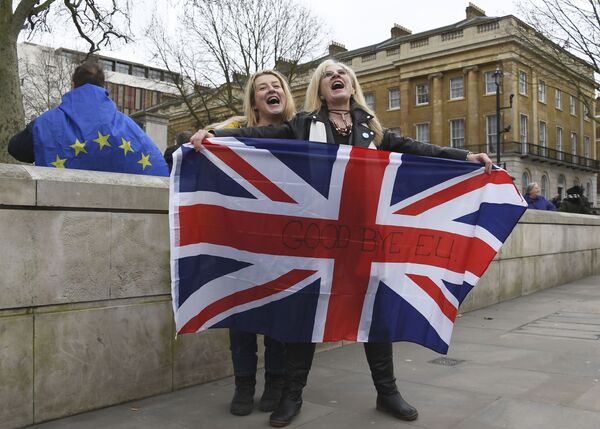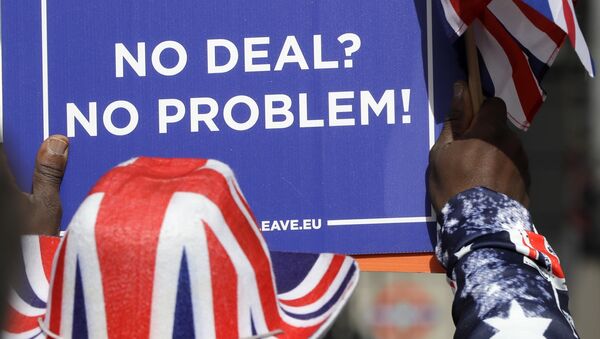Although on 7 December EU chief negotiator Michel Barnier told the European Parliament that 9 December is the deadline to strike a deal with Britain, an EU-UK compromise is nowhere near.
Following the Wednesday crunch talks between European Commission President Ursula von der Leyen and UK Prime Minister Boris Johnson, the two set a new deadline stressing that either a Brexit deal will be sealed by 13 December or there will be no deal at all. Meanwhile, “very large gaps” remain between the UK and EU despite nine months of bumpy talks, The Guardian reports, citing the negotiators. The sides have yet to find common ground with regard to three pressing issues: the level playing field (LPF), fish, and governance. A no-deal Brexit is looming as time is running out for the participants of the talks.
'It's Crucial for UK to Reach Deal With EU'
"It is extremely crucial for the UK to reach a deal with the EU, in order to be able to have a smooth transition into the new relationship between the UK and the EU", argues Dr Theofanis Exadaktylos, a senior lecturer in European politics at the University of Surrey. "An agreement guarantees the continuation of the flow of goods in and out of the UK, it ensures the non-disruption of the flow of people, and makes travelling easier".
The possibility of the worst case scenario has already prompted a transfer of jobs across the channel to France, Germany, and the Netherlands, and many companies have moved operations to European centres rather than the UK, notes the academic. He expects that a no-deal exit could hit British farmers, who would no longer receive subsidies from the EU budget, as well as the fisheries and tourism industries, logistic chains, manufacturing, and business exchanges.
"Non-agreement will definitely affect those companies with extra import duties, taxes and delays at the borders", he says. "I am not sure that any sector will gain substantially. Overall, no-deal is not better than some deal with the EU. Britain at the end of the day will have a relationship with the EU by default, so it’s best to have it on some terms, rather than WTO terms which would exclude it widely from trading and engaging the EU as a bloc".
The UK will be worse off under any post-Brexit economic arrangement with the EU, suggests Mark Garnett, a politics professor at Lancaster University. He does not believe the Leavers who say Britain will quickly recover and end up being stronger economically.
"In their eyes, No Deal might actually be better for the UK because it will maximise the country's ability to make its own economic decisions. This argument has little support among economists or the business community, and seems even less convincing since the economy has suffered the additional shock of the coronavirus pandemic", the professor warns.

No Deal: Boris Johnson's Hands Are No Longer Tied
Still, it does not appear that the British government is scared by the no-deal scenario, despite the grim prognosis.
In October, Prime Minister Boris Johnson made it clear that he preferred no deal to a bad one, saying on The Andrew Marr Show that the UK "could prosper mightily under those circumstances". Addressing his party fellows a year ago, the British prime minister noted that he wishes to avoid, but is prepared for, a no-deal withdrawal.
"While a no-deal Brexit would cause short-term disruption, particularly for manufacturers with complex supply chains, it could bring major benefits in the long term", underscores Dr Richard Wellings, acting research director at the British think tank the Institute of Economic Affairs. "It would give the UK the opportunity to free itself from the huge burden of EU regulation, reducing costs for businesses and consumers. Freer trade with the rest of the world would mean lower prices for consumers, who would no longer be forced to buy goods from overpriced EU producers. UK manufacturers would also be freer to source their components from cheaper sources outside the EU".
When it comes to the EU's agricultural and food processing sectors, they are likely to be hit hard too, as UK consumers will shift to lower-cost suppliers in the rest of the world, according to him. The bloc's car industry may also suffer as Britons will acquire better value products from emerging economies, the think tank director notes, adding that given all of the above, "the main losers from a no-deal divorce are likely to be EU producers that are currently shielded from global competition by protectionist tariffs, quotas and regulation".
However, to capitalise on all these benefits, the British government must adopt policies of deregulation and trade liberalisation, according to Wellings.
Nicola Borri, an economics and finance professor at Rome's LUISS Guido Carli University, believes that it is important to realise that it is "dangerous" for the EU to accept "a bad deal because of the risk to spark Euroskeptics and to jeopardize current talks with the governments of Hungary and Poland over similar agreements".
The professor, however, emphasises that the negative impact of a potential no-deal Brexit is largely bigger for London than for Brussels, as the United Kingdom accounts for only 4 percent of the exports and 6 percent of the imports.
"In the EU, especially in the short-term, the sectors most likely to be hit are food, transport vehicles, machinery, and electronics. Also in terms of EU regions, some will be hit more. For example, Ireland and countries in Eastern Europe, with larger trade flows with the UK, are likely to be hit more. In the long-term, it is difficult to make predictions. However, it is plausible to assume that the EU is large enough to substantially limit the negative consequences through a reallocation of resources and business activities", Borri adds.
Meanwhile, EU and UK negotiators are continuing to chew over the provisions of a potential post-Brexit trade deal, as neither of the parties involved seems willing to quit the talks first.
According to The Spectator's James Forsyth, neither Boris Johnson nor his European counterparts wants to become a target of the blame game which will inevitably start if the negotiations collapse. At the same time, while the British prime minister would still prefer to have a deal, he no longer needs one, unlike in October 2019, when he led a minority government. "This time, he has an 80-seat majority and Tory MPs are solidly behind his negotiating strategy", writes Forsyth. "In parliamentary terms, he doesn’t need a deal the way he did last year".




